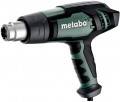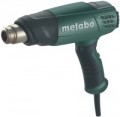Fan speeds
The number of fan speeds provided for in the adjustments of the heat gun. The intensity of blowing the workpiece, or rather the amount of air supplied and the pressure of the air flow, depends on the fan speed. And since different jobs require different intensities of air supply, the more speeds a hair dryer has, the more versatile it is, the easier it is to adjust its parameters for certain tasks. Most modern models have
2 – 3 speed adjustments, however, there are also very simple single-speed options, and even advanced devices with smooth adjustment, which allows you to select the fan speed as accurately as possible for a specific purpose.
Stepless air flow control
This option assumes that the volume of air supplied is regulated steplessly. The regulator is most often represented by a classic slider that directly changes the level of fan resistance, affecting the speed of rotation of the impeller.
Smooth flow control is necessary for a wide range of process operations, during which it is extremely important to avoid sudden (step) temperature changes.
Temperature adjustments
The number of outlet air temperature adjustments provided for in the design of the heat gun. The adjustment itself is an almost mandatory function for such a tool — after all, different types of work and different types of materials require their own temperature values, and without it you can either “underheat” or “burn through” the workpiece. The more adjustments provided in the design of the hair dryer — the finer the temperature settings, the easier it is to choose the mode that is optimal for a particular task. At the same time, it is worth noting that in this case we are talking about
step temperature control, while the most advanced option today is smooth control (see below).
Minimum heating temperature
The lowest air temperature that a heat gun can produce when operating in normal mode, in other words, the lower limit of the operating temperature range. Accordingly, the lower this limit, the wider the range, ceteris paribus, and the more versatile the tool: after all, for different jobs and temperatures, you need different ones. Some modern hair dryers have the ability to "cold" blowing, without heating.
Max. heating temperature
The highest outlet air temperature that a hair dryer can provide. As with the minimum temperature, this parameter determines how wide the operating range of the tool is and for what range of work it can be used. High operating temperatures are important not only for refractory materials — they can significantly speed up the processing of large surfaces. On the other hand, it is worth considering that for strong heating, appropriate power is required, which affects the weight, energy consumption, and often the price of the hair dryer.
Cold air mode
This option allows you to completely turn off the heating element, leaving only the fan running, or reduce the heating temperature to a minimum of 50 °C.
The cold air mode is necessary for cooling heated parts. For example, a stream of cold air will allow you to quickly cool the seams of hot melt adhesive. Most often, the cold air mode is represented by a separate position on the temperature mode switch, while cold air will be carried out at one single speed. But some models allow you to turn off the heating element by hardware, in which case cold blowing can be carried out in a wide range of speeds.
Weight
The total weight of the tool. On the one hand, heat guns are held in the hands during operation, which means that a lot of weight is undesirable for them — heavy devices are less “agile” and tyre the operator more. On the other hand, too little weight can mean low quality materials, a small thickness of insulation and, accordingly, unsatisfactory safety performance. Therefore, in most modern models, the weight is at least 500 g, and in the most advanced models it can exceed 1 kg. Also note that some "heavy" hair dryers may have a design that allows you to install them on a flat surface during operation.
If there are additional nozzles in the kit, the weight of the tool without them is usually indicated.

